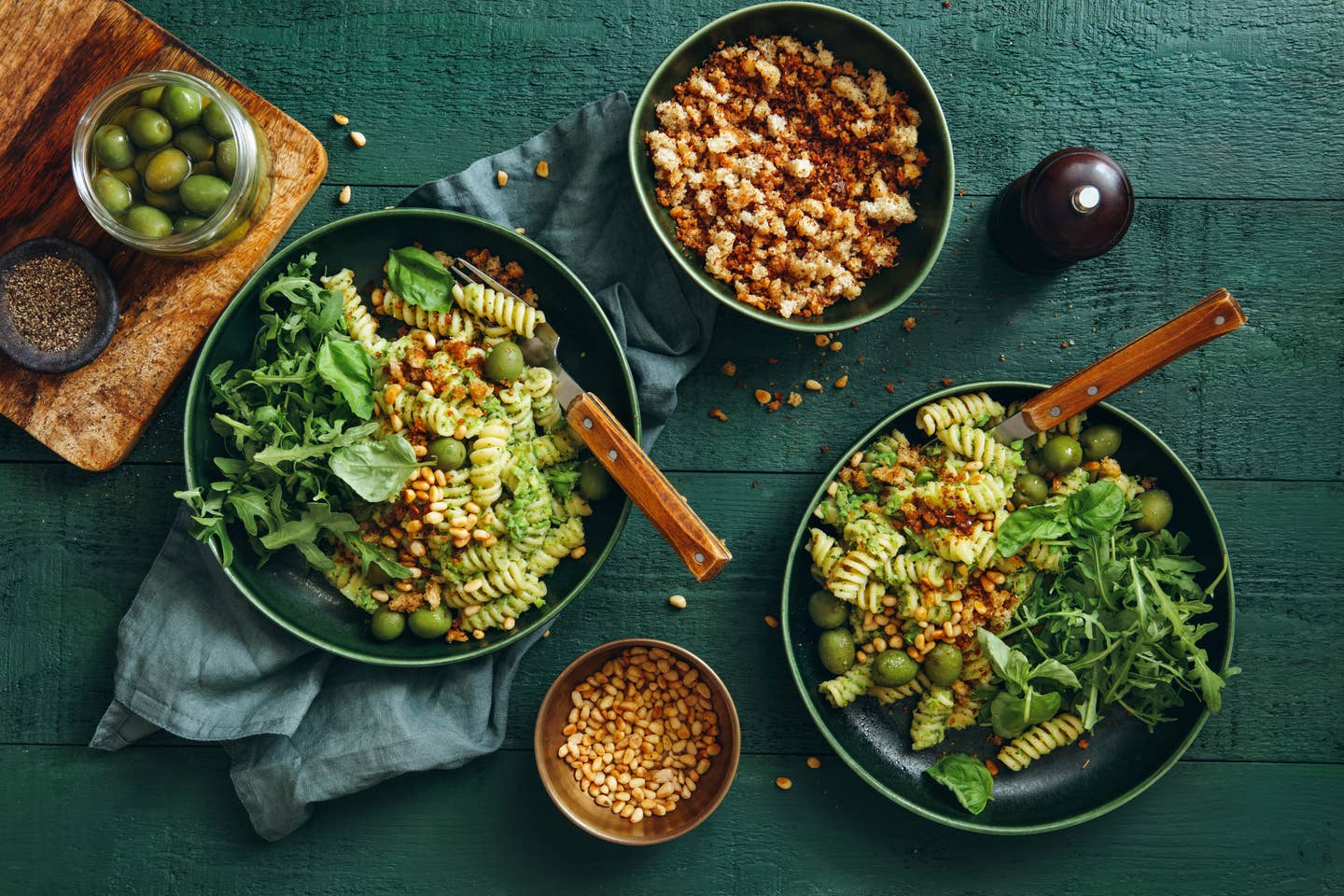
How to Add One More Vegetable Every Day for 2 Weeks to Get Healthier
Only 10 percent of Americans eat the recommended 5 servings of fruits and vegetables a day and even fewer of us get the optimal 9 servings. Before you think, "Oh, that's me!" consider how many times you've gone to the store, bought produce with the best of intentions, only to leave it to rot in the fridge? (We found that arugula decomposes into a particularly slimy puddle.)
Getting the vegetables and fruits, salad greens, and legumes home from the store is only half the battle. What to make with them and how to integrate them into your daily meals is the other half. (And while everyone thinks eating fresh veggies is expensive, it's only expensive if you don't actually eat the produced you bring home.) Of course, it's super easy and tempting to pull a pizza or other frozen entree out of the freezer and zap it for dinner, but those processed foods are full of chemicals and additives that leave you bloated and lead to weight gain, disease, and feeling sluggish, not how food is supposed to make you feel: Energized!
So we created a 14-day easy recipe guide to help you eat one more vegetable a day for the next two weeks. Each day you'll get three easy and delicious plant-based recipes to help you "just add plants" to your diet to eat more fiber and antioxidants, boost your immune system and have more energy. By filling up on fiber you're more likely to feel fuller longer and eat less overall, which will regulate blood sugar and may even help you lose weight as you get healthier every day.
Sign up for the Vegetable of the Day Recipe newsletter, so you can start getting your healthy recipes every day for the next two weeks. We'll include related health news stories that will motivate you to add one more plant to your plate–and make it super easy and delicious to reach your goal of eating 5 servings of fruits and vegetables a day.
Vegetable of the Day Sign-Up
Sign up for this inspiring and helpful "Vegetable of the Day" newsletter and get 14 days of recipes that include delicious ideas to eat a new vegetable of the day, along with all the health benefits of each one. Consider this:
Just one more serving of fruit and vegetables a day is enough to lower your risk of diabetes, according to a recent study. The more vegetables you eat, the better your lifelong health will be, this study adds.
If you eat 30 grams of fiber a day (found in vegetables) you'll feel fuller, eat less overall and lower your risk of diabetes by 50 percent. Plus the fact that you're filling your plate with high fiber foods means you can eat more food, which is a pretty good deal in the bargain.
To maintain a healthy weight, eat more fruits and vegetables. There is a direct correlation between how many fruits and vegetables you eat and how much you weigh, according to a major review study. "A generous intake of fruit and vegetables works to maintain a healthy weight because these foods have high fiber and water content, and make you feel fuller longer, the study found.
Eating more vegetables and fruits has a positive impact on your immunity, and helps fight inflammation, another study found. Your immune cells are bolstered by the antioxidants in fruits and vegetables (the same phytochemicals that help these plants fight off the oxidization of the sun help your body fight off bugs and oxidization stress from toxins in our systems).
The most amazing part is that it doesn't take much effort to eat healthier. One more serving a day can have a big impact on your longterm health and wellbeing. Add another serving of vegetables at every meal and you're doing even better. Here is our best plan to help you do that. Each day we will introduce a new vegetable and recipes to use it.
Here's the lineup. Sign up for your chance to get healthier, by Just Adding Plants
- Corn has zinc, magnesium, copper, iron, manganese, and is a source of carotenoids
- Zucchini is rich in carotenoids that lowers the risk of cardiovascular disease
- Carrots are high in Vitamin A which is good for eye health
- Kale & Spinach are packed with fiber, low in calories, and high in vitamin K
- Mushrooms contain selenium which boosts immunity and they protect against cancer
- Eggplant has vitamins C, K, and B6, and potassium; they help control blood sugar
- Squash is high in vitamins A, C, and B6, fiber, and magnesium
- Chickpeas improve digestion and are high in protein and fiber
- Tomatoes contain lycopene, linked to a reduced risk of heart disease and cancer
- Avocados are a great source of vitamins C, E, K, and B6, and omega-3 fatty acids
- Peas are rich in fiber, vitamin K, iron, and protein and help to regulate blood pressure
- Cabbage has beta-carotene, lutein, and can help prevent heart disease
- Broccoli contains fiber, iron, potassium, calcium, selenium, magnesium, and folic acid
- Beets are high in folate, manganese, potassium, iron, and improve blood pressure
Let us know if we left off any of your favorite vegetables or legumes and we can add them to the roster. Get in touch with The Beet on Facebook and let us know which vegetables, fruits and legumes you want us to add next.
More From The Beet






